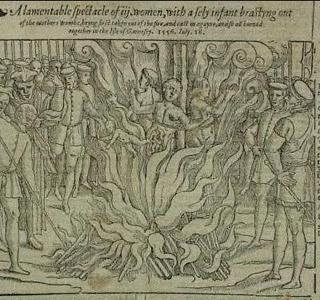A "Holy Body"
 I come from a Christian tradition which believes in "holiness"--the setting apart of one's self for service to Christ. In his recent book, Why Study the Past: The Quest for the Historical Church, Rowan Williams, Archbishop of Canterbury, maintains that it was the narrative of martyrdom which became the primary demonstration of Christian "legitimacy" to the Roman Empire in the early church and that the martyr's body became a tangible construct of "the suffering body expelled from the body politic."
I come from a Christian tradition which believes in "holiness"--the setting apart of one's self for service to Christ. In his recent book, Why Study the Past: The Quest for the Historical Church, Rowan Williams, Archbishop of Canterbury, maintains that it was the narrative of martyrdom which became the primary demonstration of Christian "legitimacy" to the Roman Empire in the early church and that the martyr's body became a tangible construct of "the suffering body expelled from the body politic."Having worked with Foxe's Acts and Monuments, I know something of the power of the combination of text and woodcut. But Williams goes even further, claiming that, "the martyr is the conduit of divine presence who vindicates the claim to another citizenship." Polycarp of Smyrna is perhaps the greatest example, emulating Ignatius of Antioch's belief that the martyr's killing in the arena by wild beasts was analogous to the eucharistic bread being ground up by the recipient. As such, the martyr rather literally became a "living sign" of Christ's love. "The holy body," Williams says, "must be one that is consumed by the divine."
Could it be that this ancient belief has become, in some twisted and distorted way, fuel for the fire by today's terrorists? In the early church, obviously, there was no sense of destruction stemming beyond one's own body into the horrific deaths that we see today. But this "obliteration of the self" might somehow be connected to this claim to legitimacy and holiness. It would seem to me that the church is called upon to find ways of responding prophetically to this gnostic culture of suicide and death which recognizes the power of the martyr's cult while positing a constructive notion of holiness as a counter-cultural weight.


<< Home